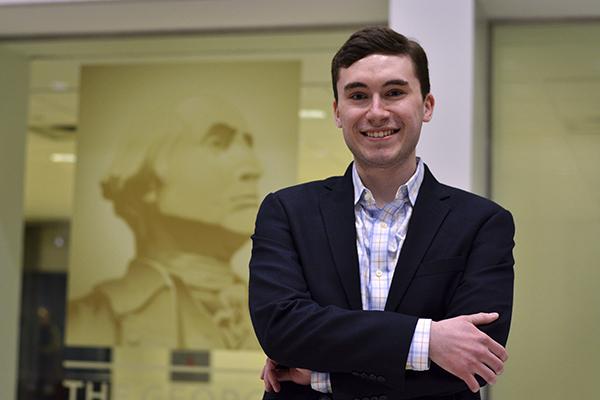A junior who has served on the Student Association Senate this year announced his campaign for executive vice president Thursday, running on a platform that prioritizes creating healthier dining options for students.
Sen. Casey Syron, CCAS-U, said the focus of his campaign could come at an opportune time as the University’s contract with its food provider, Sodexo, will expire in 2016.
He said he would work with organizations like the Food Justice Alliance and the Urban Food Task Force to lobby for healthier food options and making those meals more affordable.
Syron would look to implement a swipe system for dining, similar to those used in colleges across the country, where students are charged one fee for eating from a GW vendor instead of paying by the weight of their food.
“I view the nutritional needs of someone who is 5’6″ as vastly different than someone who’s an athlete and 6’5″,” he said. “I don’t really think it’s fair to students that they should pay the same tuition prices or be allotted the same amount of J Street money, or GWorld money for that matter, but also pay the same amount but not necessarily eat the same amount.”
He joins two other executive vice presidential candidates — sophomores Carlo Wood and Spencer Perry — four weeks before the election. That makes him the oldest candidate to run for the SA’s No. 2 post, in which, aside from advocating for student needs, he would lead the SA Senate.
As executive vice president, Syron said he would also try to allow students to utilize free counseling sessions at any point during their college careers. The University allots students six free sessions a year, which comes to 24 free sessions if they complete their degrees in four years. He said students should be able to use those 24 sessions whenever they need them, instead of having to portion them across the years they plan to be on campus.
“I think the University needs to take a more holistic approach to everything, and right now we need more to focus on mental health,” he said.
The political science major said he will also work with administrators to expand the boundaries for 4-RIDE, although he is not sure by how much or in which areas. He said he would meet representatives from GW and D.C. police to determine which areas around campus are the most dangerous at night and make sure 4-RIDE services them.
“It’s not fair for the students who can’t afford to live on campus or live near Foggy Bottom to have to worry about walking home at 2 a.m. after they finish a paper in Gelman,” Syron said.
Syron said he will also focus on implementing mandatory sexual violence education for GW students. He was one of 11 senators who co-sponsored a bill about the issue that passed the SA Senate on Monday. The measure will put whether the University should create required sexual violence education training at Colonial Inauguration to a student-wide vote on next month’s ballot.
Like the other candidates so far, Syron is established on campus. This fall, his fraternity, Delta Tau Delta, raised $24,000 through its philanthropy to help cover medical expenses for Syron’s father, who was fighting cancer for the fourth time. His father died earlier this year.
The Illinois native is his fraternity’s treasurer, as well as a member of Allied in Pride and the College Republicans. In the past, he has participated in the Fourteenth Grade Players and the GW Taekwondo Club. He said he is one level away from receiving his black belt.
Syron was a child actor, working as what he called a “husky” model for Gap Kids and playing a bully to Jason Segel’s character in a failed Billy Madison sequel. He will return to the screen as an extra in the third season of “House of Cards,” which will be released Friday.
He said his time on the SA Senate has taught him how to best work with other senators, a skill he would need as the body’s leader. Syron said he would aim to see more major legislation come out of the senate instead of resolutions that tack onto initiatives already launched by the SA president.
Executive Vice President Avra Bossov has called for more organization and preparation among senators this year after several meetings spiraled into confusion and sometimes hostile debates.
“If elected, I’d be largely focused on trying to make the SA Senate more functional because when it’s functional, we can truly do great things for the student body,” he said.







